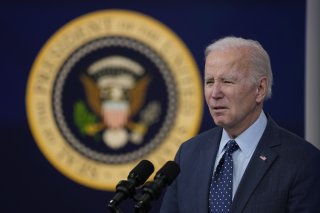Joe Biden’s Handling of U.S. Steel Sale Harms U.S.-Japan Ties
Trying to block this merger not only imperils a relationship with a crucial ally but also provides an increasingly belligerent China with another means of leverage.
In less than one month, Japan’s prime minister, Fumio Kishida, will visit U.S. president Joe Biden at the White House, marking the first official state visit and state dinner of 2024. Usually, the run-up to these major summits is managed very deliberately to ensure that the strategic context of the bilateral relationship is presented in the best possible light, ensuring the leaders have smooth and productive talks.
However, President Biden’s unnecessarily public and fervent opposition to the proposed sale of U.S. Steel to the Japanese company Nippon Steel casts a shadow not only on the state visit but also the relationship as a whole. President Biden’s recent statement during a campaign event—“U.S. Steel has been an iconic American steel company for more than a century, and it is vital for it to remain an American steel company that is domestically owned and operated”—certainly demonstrates that politics trump sound policies today.
As someone who has spent decades working on the U.S.-Japan alliance, I am dismayed by the president’s decision to make such statements in today’s volatile international context. During Prime Minister Kishida’s tenure, the Japanese government has taken unprecedented steps to support and align itself with U.S. strategic priorities, doubling its defense budget and making other controversial domestic moves. Recently, Japan broke all precedents by filling the U.S. void in helping Ukraine’s fight against Russia. In a move that surprised Asia watchers, Japan shipped Patriot missiles to the United States to help Ukraine with badly needed munitions. This was a politically courageous action by Tokyo, signaling a willingness to do more to enhance the U.S.-Japan alliance.
In the face of Japan’s commitment to America and its vision for a safer world, the Biden administration has unfairly lumped Japan in the same category as China and Russia by publicly opposing Nippon’s proposal to acquire an American company.
Much like the Patriot missile transfer, this proposal can and should be viewed as Japan investing in its relationship with its strongest ally. By making an arguably compelling offer to acquire U.S. Steel, the Japanese aim to invest in America’s manufacturing sector, which would benefit our economy with an unprecedented inflow of capital and resources and revitalize a critical industrial sector.
Keep in mind that these deals are just business as usual. Japan has been our top provider of foreign direct investment since 2021 and our fourth-largest trading partner. However, by coming out and explicitly opposing this deal at such a critical juncture, President Biden is unnecessarily politicizing a policy issue for his campaign.
Trying to block this merger not only imperils a relationship with a crucial ally but also provides an increasingly belligerent China with another means of leverage. Anti-American propaganda from Beijing has become sharper, starting with accusations of xenophobia and an atmosphere of anti-Asian hate. This is a line of attack that has intensified since the COVID-19 pandemic. With more recent efforts by Congress to ban the Chinese social media platform TikTok, Beijing has yet another opportunity to weaponize anti-American sentiments.
Beijing is also not above calling us a common enemy of the world. In response to an October 2023 Pentagon report that reveals China’s growing nuclear arsenal, the Chinese Defense Ministry labeled the United States as the “biggest disrupter of regional peace and stability.” While this may sound like nonsense to us and our partners, it may resonate with those skeptical of America’s global leadership. Consequently, President Biden’s decision to denounce a business deal with our closest ally only adds fuel to the fire.
More than ever, the world needs a display of leadership and commitment to global cooperation from the United States. From the conflict between Israel and Hamas, the ongoing war in Ukraine, and intensifying global competition with Russia and China, we must continue to step up to the challenge—both at home and abroad. Doubting our closest ally’s offer to invest in our economy will only disappoint our friends and satisfy our adversaries around the world. To reject the U.S. Steel-Nippon deal will undercut one of America’s greatest strengths—its alliances with like-minded partners such as Japan—and strikes a stark contrast to the president’s own words in 2022: “The alliance between our two countries is stronger than it’s ever been and it’s as important as it has ever been.”
Heino Klinck was the Deputy Assistant Secretary of Defense for East Asia, 2019–21, with responsibility for bilateral defense relations with Japan.
Image: Shutterstock.com.

